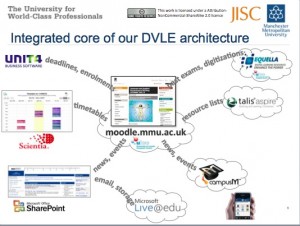Over the past 18 months the projects funded through the JISC DVLE (Distributed Virtual Learning Environments) programme have been exploring ways to extend their provision of teaching and learning services. The W2C and SLEP projects joined for an virtual brown bag session to give an overview of the work they have been undertaking – particularly around developing access to greater and more personalised information for students.
Mark Stubbs (W2C project) started the session giving an overview of what they now call their Core+ DVLE model, aka their “mega mash-up”.

W2C Megamashup diagram
With their VLE (Moodle) at the centre the team have developed a number of web services from a range of institutional systems. This is now allowing students to access a number of services such as timetabling, PC availability, reading lists etc from mobile devices. Taking this web service approach has allowed the team to use the “develop once, deploy often” approach. Consistent tagging (based on existing commonly used tags such as course IDs etc) has also been key for integration. Mark also took us through some very interesting stats around usage of the services, and the students use of mobile devices.
Hugh Davies, Dave Millard and Yvonne Howard the took us through developments from the SLEP project. There are a number of similarities to be drawn to the mega mash-up approach of W2C. However a key difference being that Southampton don’t have a VLE at the centre, instead Sharepoint is at the centre of their developments, with new UIs being developed for students to access information. Using Sharepoint hasn’t been without it’s challenges, as the team did highlight, it hasn’t been as flexible as they first thought, however they are using the project to try and introduce more agile and user centred development processes into the mainstream of institutional provision of services.
Being Southampton the team have also be investigating ways to increase the use of open data, and so have been spending time working with internal groups such as the Data Access Group, to try implement and develop policy around the use and sharing of data.
The actual apps/services which each project has/is developing are pretty unique to each institution, however the over-arching principles and techniques could be applied to many institutions and shows that it is possible to create more distributed learning environments through the greater integration of existing systems allowing access from multiple devices. To find out more, a recording of this highly informative session is available online.
More information about the DVLE programme, including links to previous online sessions is available on the CETIS wiki.